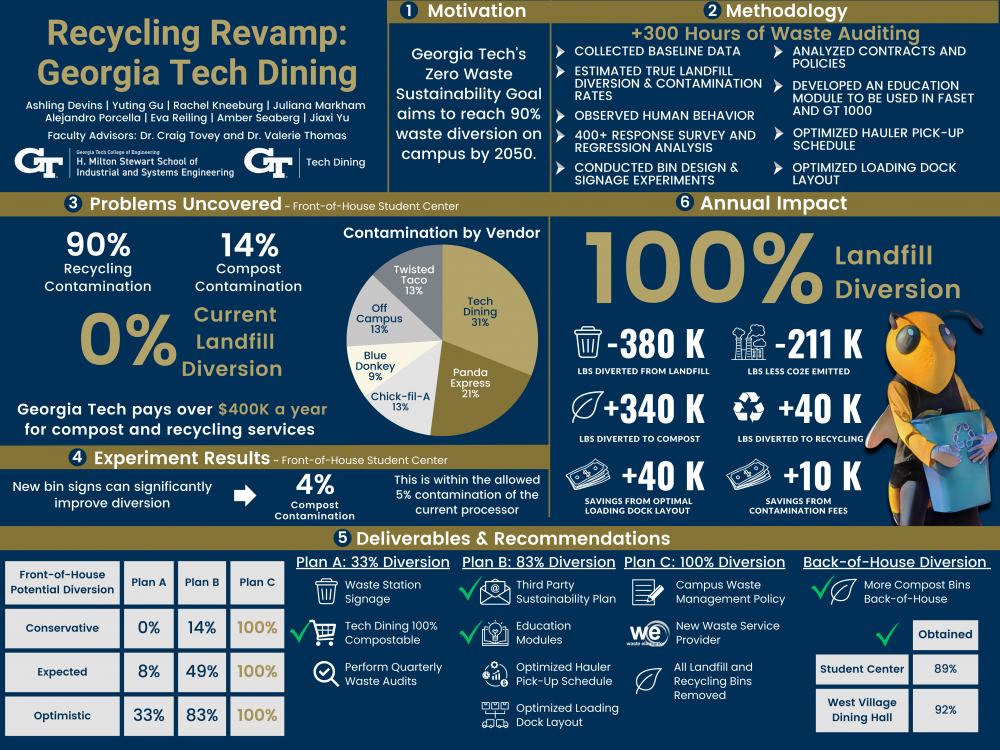Client Context
Georgia Tech Dining is the department within Georgia Tech Campus Services that is responsible for the management of dining locations, meal plans, and catering. The dining locations serve over 12,000 students and faculty each day. Locations include the community market, campus retail, food trucks, the John Lewis Student Center (JLSC), and dining halls. For this project, the scope is the JLSC and dining halls, using the West Village Dining Hall as a proxy for all three dining halls.
Project Objective
The objective of this project is to design the framework required to reach 90% waste diversion within Georgia Tech Dining facilities.
Design Strategy
The team first set out to interview a diverse number of stakeholders that interact with our system. These included discussions with Georgia Tech staff from the Dining and Waste Management departments, custodial workers, waste haulers, and a survey with 400 student participants. The team also conducted over 300 hours of baseline data collection (waste auditing) to determine the true contamination and landfill diversion rates in the front-of-house (cafeteria seating, etc.) and back-of-house (kitchens, etc.) areas of the John Lewis Student Center and West Village Dining Hall. After determining which area of our system had the lowest landfill diversion rate, the team conducted experiments to affect user behavior and improve contamination in this area, along with attacking the low landfill diversion rate through procurement, waste hauler choice and other aspects of the Tech Dining Waste Management system. The team also considered what changes to the Tech Dining system needed to be made to run a successful waste management operation, to plan for a future scenario where landfill diversion in Tech Dining is improved.
Deliverables
As a waste management system has many stakeholders that interact with it, our team produced a number of deliverables to affect these stakeholders. The team:
- Designed user friendly waste stations to improve waste sorting by the user
- Identified and compiled a comprehensive resource hub of compostable products for Georgia Tech Dining
- Wrote letters to 3rd party vendors on campus supported with waste audit data to implore them to change hard-to-recycle products to compostables
- Created a waste-sorting education module for GT1000 and FASET
- Designed a future loading dock layout based on increased compost capacity and costs
- Optimized Georgia Tech Dining’s waste haulers’ pick-up schedule
- Drafted a comprehensive campus-wide waste management policy
- Interviewed and recommended alternative compost haulers
- Recommended increased compost bin placement based on material flows in parts of the Georgia Tech Dining system.
Value and Impact
By implementing the team’s strongest recommendations and full strategy, Georgia Tech Dining can save 380,000 pounds of trash from being landfilled each year. Of this, 340,000 pounds can be redirected to compost and 40,000 to recycling. From the food waste redirected to compostl, Tech Dining can save 211,000 pounds of CO2e from being emitted into the atmosphere each year, equivalent to the release of 21 cars' worth of annual CO2e emissions into the atmosphere each year.
The team estimates the financial impact of the project to be $10,000 saved per year on contamination fees from waste pick-up haulers (if Georgia Tech Dining implements phase B or C of the team’s strategy), and $40,000 saved per year if Georgia Tech Dining implements the optimized layout dock design and optimized pick-up schedule developed.


